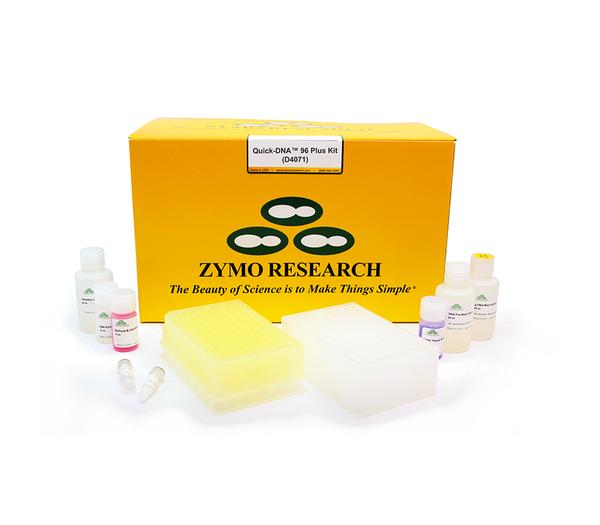
Highlights
- Extract high-quality DNA easily and reliably from any biological fluids, cultured/monolayer cells, or solid tissues.
- Zymo-Spin Technology ensures DNA is ready for all sensitive downstream applications such as qPCR, DNA-sequencing, arrays, and methylation analysis.
Description
Technical Specifications
| Elution Volume | ≤ 15 µl |
|---|---|
| Equipment | Water bath or heat block (55°C), microcentrifuge, and vortex. |
| Purity | High quality DNA is ready for all sensitive downstream applications such as PCR, endonuclease digestion, Southern blotting, genotyping, Next-Gen sequencing, bisulfite conversion, etc. (A260/A230≥ 2.0). |
| Size Range | Capable of recovering genomic and mitochondrial DNA sized fragments > 50 kb. If present, parasitic, microbial, and viral DNA will also be recovered. |
| Workflow | Utilize a Proteinase K Digestion and Zymo-Spin Column for effective recovery of DNA. |
| Yield | The DNA binding capacity of the well is 5 µg. Typically, mammalian tissues yield: 1-3 µg DNA per mg skeletal, heart, lung, and brain tissues and 3-5 µg DNA per mg liver and kidney. Human whole blood will yield 3-7 µg DNA per 100 µl blood sampled. |
Product FAQ
Q1: Can I use Quick-DNA Plus to clean-up previously isolated DNA?
No, the kit is designed for direct use with biological samples. For clean-up of previously isolated DNA, please use the Genomic DNA Clean & Concentrator or the DNA Clean & Concentrator kits.
Q2: What are the expected yields for each sample type?
Keep in mind that there is sample to sample variability.
| Sample Type | Input Amount | Expected Yield |
|---|---|---|
| Eukaryotic Cells | 1×106 Cells | 5-6 µg |
| Skeletal, Heart, Lung, Brain Tissue | 1 mg | 1-3 µg |
| Liver and Kidney Tissue | 1 mg | 3-5 µg |
| Human Whole Blood | 100 µl | 5-7 µg |
Q3: I’m seeing some yield inconsistencies with my blood samples, what’s happening?
White blood cells, which are the major source of genomic DNA in blood, easily and quickly settles. Mix the blood sample well prior to aliquoting for purification.
Q4: Can Proteinase K digestion be performed overnight in DNA/RNA Shield?
Yes, samples can be digested overnight. Make sure to follow the appendix (page 8 appendix B) for processing liquids samples in DNA/RNA Shield and incubate at room temperature.
Q5: What is the difference between Quick-DNA and Quick-DNA Plus kits?
The Quick-DNA is optimized for cells, soft tissues, and homogenized/digested samples using a single lysis/binding buffer. The Quick-DNA Plus kits contain an optimized Proteinase K for processing a wider variety of sample inputs, such as cells, blood, tissues, etc. The upgraded Quick-DNA Plus recovers more DNA with higher purity compared to the Quick-DNA Kits.
Q6: Can the Quick-DNA Plus kit be used with bacterial samples?
E.coli cells are easy-to-lyse and can be processed directly with the Biological Fluids & Cells protocol. For an all-inclusive kit with any type of microbes (including tough-to-lyse), use any of Zymo Research’s Environmental Kits (e.g. Quick-DNA Fungal/Bacterial, Quick-DNA Fecal/Soil, ZymoBIOMICS DNA, etc.).
Q7: What is the difference between the digestion buffers? Can one buffer be used for all sample types?
The BioFluid & Cell Buffer (Red) is designed to allow for rapid Proteinase K digestion with easy-to-lyse samples (e.g. mammalian cells and biological fluids).
The Solid Tissue buffer (Blue) can be used for any sample type and requires a longer PK digestion time compared to using the BioFluid & Cell Buffer (Red).
Q8: Can Quick-DNA process crude lysates?
Yes, add 4 volumes of Genomic Lysis Buffer to 1 volume of crude lysate, homogenized, or digested sample (see Cell Suspensions and Proteinase K Digested Samples) and proceed with the remainder of the protocol.
Q9: What is the purpose of adding beta-mercaptoethanol? Can this step be substituted or omitted?
Beta-mercaptoethanol is a reducing agent that helps break down proteins and improves DNA recovery and purity. Addition of beta-mercaptoethanol is recommended to enhance sample lysis, but can be substituted with dithiothreitol (DTT, final concentration of 10 mM) or omitted.
Citations
Kit Components
| Cat # | Name | Size |
|---|---|---|
|
D3004-2-100 |
g-DNA Wash Buffer | 100 ml |
|
D3004-2-50 |
g-DNA Wash Buffer | 50 ml |
|
D3004-4-10 |
DNA Elution Buffer | 10 ml |
|
D3004-5-50 |
DNA Pre-Wash Buffer | 50 ml |
|
D4068-1-12 |
BioFluid & Cell Buffer (Red) | 12 ml |
|
D4068-1-25 |
BioFluid & Cell Buffer (Red) | 25 ml |
|
D4068-2-10 |
Solid Tissue Buffer (Blue) | 10 ml |
|
D4068-2-22 |
Solid Tissue Buffer (Blue) | 22 ml |
|
D4068-3-45 |
Genomic Binding Buffer | 45 ml |
|
D4068-3-85 |
Genomic Binding Buffer | 85 ml |
|
C2002 |
Collection Plate | 2 Plates |
|
C2003 |
Elution Plate | 2 Plates |
|
C2010 |
Zymo-Spin I-96-XL Plates | 2 Plates |
|
C2007-2 |
96-Well Plate Cover Foil | 2 Foils |
|
C2007-4 |
96-Well Plate Cover Foil | 4 Foils |
|
P1002-2 |
96-Well Block w/ Cover Foil | 2 Blocks/foils |


